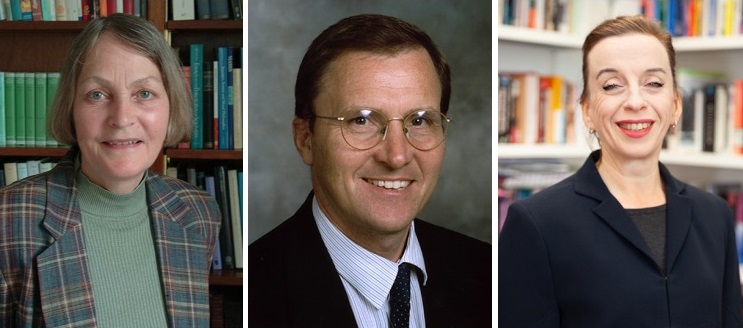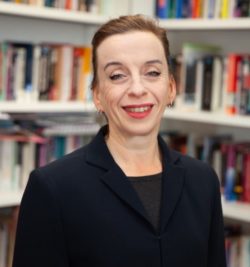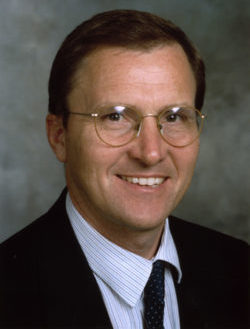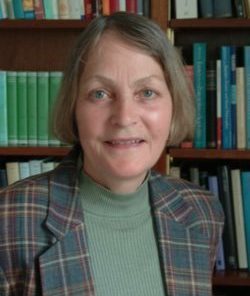St Andrews professors honoured

Three professors from the University of St Andrews are recognised in the Queen’s Birthday Honours List, published today, Friday 7 June 2019.
 Professor Ali Watson, an expert in international relations and co-founder of the Third Generation Project, a human and community rights think-tank that focuses on the felt impacts of climate change, is awarded an OBE, and Professor Ian Boyd, a prominent scientist, former Director of the Scottish Oceans Institute and currently Chief Scientific Adviser to DEFRA, is awarded a Knighthood.
Professor Ali Watson, an expert in international relations and co-founder of the Third Generation Project, a human and community rights think-tank that focuses on the felt impacts of climate change, is awarded an OBE, and Professor Ian Boyd, a prominent scientist, former Director of the Scottish Oceans Institute and currently Chief Scientific Adviser to DEFRA, is awarded a Knighthood.
Professor Watson, who was educated at Powis (now St Machar) Academy in Aberdeen, followed by degrees from the Universities of Aberdeen, Glasgow and Dundee, is Managing Director and co-founder of the Third Generation Project, a think-tank based in the St Andrews School of International Relations dedicated to, in theory, empowering communities impacted by climate change to dictate research and policy agendas.
Her research focuses upon what happens when we look at the international system differently, and prioritise those not in power, rather than in power. This has included a long-term focus on the place of children and youth in global politics, where her work has been instrumental to the development of the field. This also extends to more recent work in North America and East Africa where she has been involved in documenting and examining both the nature of ongoing human rights violations of the private and public sectors against indigenous communities and the responses of these communities to them. This work has secured funding from the British Academy and National Geographic Society, amongst others, to do so.
This led to her co-founding the Third Generation Project which prioritises working with frontline communities to change the conversation around the human rights implications of the climate crisis to a more inclusive one that prioritises community-led solutions for academics, policymakers and practitioners. They are currently funded by National Geographic Society to develop, in conjunction with academics, community organisers, journalists and environmentalists in the UK, Germany, Somaliland and Kenya, educational multimedia materials on climate change to be used in Scottish classrooms.
Professor Watson said: “This recognition is truly a privilege, considering I see how so many colleagues in my field work so hard without receiving individual acknowledgement. So while I am personally humbled, this award actually speaks to the work being done by so many, and of course to the strength of my family, a community that is not bound in blood but by a shared love.”
 Professor Sir Ian Boyd is the Chief Scientific Adviser to the Department of Environment Food and Rural Affairs. He was formerly Director of the Scottish Oceans Institute at the University of St Andrews and the Sea Mammal Research Unit, a partner institute of the Natural Environment Research Council, from 2001 to 2012. Professor Boyd now holds a part-time post at St Andrews, in addition to his DEFRA brief, advising the Principal’s Office on policy.
Professor Sir Ian Boyd is the Chief Scientific Adviser to the Department of Environment Food and Rural Affairs. He was formerly Director of the Scottish Oceans Institute at the University of St Andrews and the Sea Mammal Research Unit, a partner institute of the Natural Environment Research Council, from 2001 to 2012. Professor Boyd now holds a part-time post at St Andrews, in addition to his DEFRA brief, advising the Principal’s Office on policy.
He is being honoured for his “visionary leadership, exemplary scientific research and innovative approach” to the development of national policy and strategy.
As a departmental Chief Scientific Adviser, Ian Boyd is a Director-General in the UK Civil Service. In addition to advising ministers and senior officials on scientific matters, he has chaired the Project Board for the latest projections of the UK’s climate, and delivered key reports on Waste and Resource productivity and the Future of the Seas, which have underpinned UK policy change. He was also instrumental in returning a safe environment in Salisbury through his chairing of the Decontamination Science Advisory Group as a key response to the chemical attack which took place there in 2018. He has also led on the UK’s strategy for eradicating bovine tuberculosis.
He was responsible for the creation of the Marine Alliance for Science and Technology for Scotland in 2009, a partnership of nine institutions conducting marine science across Scotland. He is a member of the Scottish Science Advisory Council, chair of a scientific advisory board on decommissioning for Oil and Gas UK.
Much of Professor Boyd’s career was spent in polar science when he worked for the British Antarctic Survey from 1987 to 2001 where his interests were focused on the behavioural and physiological ecology of Antarctic seals and the ecology and management of the Southern Ocean. He was Chief Scientist for a US Navy study examining the behavioural responses of whales to military sonar and a co-developer of environmental risk management procedures used by the Royal Navy. He served on two enquiries into the future of Scottish Fisheries and the implications of Common Fisheries Policy reform for the Scottish fishing industry and was a member of an international task force which recommended a global 50 per cent reduction in the level of fishing for some of the planet’s most abundant fish species.
At St Andrews, he was responsible for establishing the Scottish Oceans Institute (SOI) as a multidisciplinary research establishment focused upon marine resource management.
As Director of the NERC Sea Mammal Research Unit (SMRU) at St Andrews, he led the University to obtain the Queen’s Anniversary Prize in 2011.
Professor Boyd has BSc and DSc degrees from the University of Aberdeen and a PhD from Cambridge University and has received prizes for his research, including the Scientific Medal of the Zoological Society of London, the Bruce Medal for Polar Science from the Royal Society of Edinburgh and The Polar Medal awarded by Her Majesty The Queen. He is also a Fellow of the Royal Society of Edinburgh.
Professor Boyd said: “I am obviously delighted to have been honoured in this way. It is difficult to fully comprehend why I have been selected but I am very grateful. Throughout my life I have only tried to do those things which I thought were interesting and that might make a difference, and I have always tried to do them to the best of my ability.”
 Widely regarded as the world’s foremost authority on Aristotle, Professor Sarah Broadie is a leading expert in Classical Philosophy and has published seven books as well as 75 articles and reviews on both classical and modern philosophy.
Widely regarded as the world’s foremost authority on Aristotle, Professor Sarah Broadie is a leading expert in Classical Philosophy and has published seven books as well as 75 articles and reviews on both classical and modern philosophy.
During a career spanning 50 years, Professor Broadie has worked ceaselessly to advance the understanding of ethics, metaphysics and, particularly, classical philosophy through research of the highest international standing and teaching that has inspired generations of undergraduates and younger scholars.
Prior to St Andrews, Professor Broadie taught at Edinburgh University, the University of Texas at Austin, Yale, Rutgers and Princeton, before returning to Scotland to take up a Professorship at St Andrews.
She became a Fellow of the American Academy of Arts and Sciences in 1991. She was elected as a Fellow of the Royal Society of Edinburgh in 2002, a Fellow of the British Academy in 2003 and a member of the Academia Europaea in 2006.
She served as Vice-President of the British Academy from 2006 to 2009, was President of the Aristotelian Society from 2012 to 2013 and the Mind Association from 2008 to 2009. It is of real significance that all this was achieved at a time when female scholars were few in number.
Professor Broadie has been recognised with an OBE. She said of the award: “It’s a great pleasure to me that our subject of classical philosophy should receive this recognition.”
Category Awards